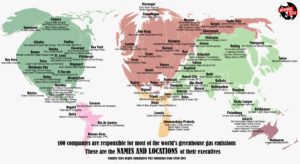The Corporations That Plundered the Earth While Making Huge Money: A Look at the Dark Side of American Capitalism
America’s rise to power is often told through the lens of ingenuity, innovation, and unparalleled economic growth. From the humble beginnings of colonization to the industrial boom and the rise of the tech giants, there is no denying that American companies have played a significant role in shaping the global economy. However, history also bears witness to an underbelly of exploitative practices — companies that have profited handsomely while plundering the earth, its resources, and its people. This is a story of corporate greed and ecological destruction, a narrative where some of the country’s most famous corporations built their fortunes by extracting wealth at an unsustainable cost.
The following is an exploration of the top known companies in American history that have made billions while leaving behind a trail of environmental devastation, social inequity, and economic manipulation.
1. Standard Oil: The Father of Corporate Monopolies
No discussion of corporate greed would be complete without mentioning John D. Rockefeller’s Standard Oil, a company that epitomized the ruthless nature of late 19th-century capitalism. Rockefeller’s oil empire became synonymous with monopolistic practices, creating a monopoly so powerful that it controlled nearly 90% of the United States’ oil industry by the 1880s.
Standard Oil’s practices were legendary in their exploitation of natural resources. The company aggressively suppressed competition by undercutting prices, bribing politicians, and engaging in predatory tactics to acquire rivals. However, these maneuvers were not just about market domination — they were also about extracting vast wealth at the expense of workers and the environment.
Rockefeller’s oil extraction practices resulted in widespread ecological damage. Oil spills, deforestation, and the contamination of water supplies became commonplace as Standard Oil operated with minimal regard for environmental concerns. The company’s monopoly led to a cycle of stagnation in technological innovation, with the industry often more focused on maintaining dominance rather than developing cleaner and more efficient energy solutions.
The eventual breakup of Standard Oil in 1911, under antitrust laws, didn’t fully mitigate the harm the company caused. Its legacy of corporate malfeasance remains an iconic example of unchecked capitalism plundering both natural and human resources for profit.
2. The Union Pacific and Central Pacific Railroads: The Destruction of Native Lands and Ecosystems
In the mid-19th century, as the U.S. government sought to expand westward, two railroad companies — Union Pacific and Central Pacific — became the primary agents of this expansion, making enormous profits by connecting the East Coast to the West. While their success is heralded as an engineering marvel, the railroads also played a significant role in plundering the land, decimating native populations, and contributing to ecological degradation.
To build the Transcontinental Railroad, both companies were granted vast tracts of land by the federal government, often at the expense of Native American tribes. The land that the railroads received was used for railroad construction, and much of it was subsequently sold off to settlers and investors, further displacing indigenous peoples from their homelands.
Furthermore, the construction of the railroad contributed to the near-extinction of the American bison, a species that was vital to Native American cultures. Railroads facilitated the mass slaughter of bison, and the expansion of railroad infrastructure encouraged the growth of towns and industries that relied on the exploitation of the land.
As a result, the railroad companies made staggering profits while facilitating one of the most brutal chapters in American history, contributing to the loss of ecosystems, wildlife, and indigenous cultures.
3. ExxonMobil: Fossil Fuel Extraction and Environmental Catastrophes
As one of the largest and most profitable companies in the world, ExxonMobil has long been associated with the plunder of the Earth’s fossil fuel reserves. Beyond the routine extraction of oil and gas, ExxonMobil’s history is also intertwined with some of the most significant environmental disasters in modern history. From the Exxon Valdez oil spill in 1989 to its ongoing role in climate change denial, ExxonMobil has shown a staggering disregard for environmental stewardship in its quest for profit.
The Exxon Valdez disaster, which spilled nearly 11 million gallons of crude oil into Alaska’s Prince William Sound, remains one of the worst environmental catastrophes in history. Despite efforts to clean up the spill, its ecological impact lasted for decades. Wildlife populations were decimated, ecosystems were irreparably damaged, and the long-term consequences of the spill continue to affect the region.
ExxonMobil’s practices are also a key contributor to climate change, as the company has long been involved in the extraction and sale of oil and gas without acknowledging the environmental costs. For decades, ExxonMobil funded misinformation campaigns to downplay the threat of climate change, even as its own scientists recognized the dangers posed by greenhouse gas emissions. This active effort to obstruct climate science has ensured that the company continues to profit from fossil fuels while the planet suffers from the resulting climate crisis.
4. Monsanto (now Bayer): Chemical Warfare on the Land
Another controversial corporate titan, Monsanto (now part of Bayer), became infamous for its role in the global chemical industry and its contributions to environmental damage. Monsanto is most well-known for its production of glyphosate, the key ingredient in Roundup, a weed killer that has been linked to cancer, ecological destruction, and the collapse of biodiversity.
Monsanto’s business practices extended beyond herbicides. The company aggressively promoted genetically modified (GM) seeds, designed to be resistant to Roundup. These GM seeds were sold to farmers, who were often locked into purchasing cycles that involved not just the seeds but the herbicide as well. Monsanto’s legal battles with farmers who attempted to save seeds from previous harvests created a monopoly on agriculture that deeply affected both food sovereignty and biodiversity.
The environmental consequences of Monsanto’s actions are stark. The widespread use of glyphosate has led to the contamination of water sources, soil, and biodiversity. Additionally, monoculture farming, which Monsanto championed, led to the depletion of soil health and the loss of genetic diversity in crops.
5. Apple: The Price of Cheap Labor and Resource Extraction
Apple Inc. has built its empire on the back of innovation, creating products that are now indispensable to modern life. However, the company’s success has also been deeply tied to exploitative labor practices and the plundering of natural resources.
Apple’s massive supply chain relies on low-cost labor from countries like China, where workers in factories such as Foxconn have faced hazardous working conditions, long hours, and poor wages. The company’s efforts to drive down production costs have led to accusations of worker exploitation and labor violations, with reports of suicides and violent protests erupting in response to the harsh conditions.
Moreover, Apple has been criticized for its reliance on rare-earth minerals, which are often extracted in ways that cause environmental degradation. Mining operations in countries like the Democratic Republic of Congo, where Apple sources cobalt, have been linked to both environmental harm and human rights abuses, including child labor. The company’s failure to adequately address these issues paints a grim picture of the hidden costs of its global success.
A Legacy of Plunder
The companies mentioned above are only a few of the many that have prospered at the expense of people and the planet. From the extraction of natural resources to the exploitation of labor and the erosion of ecosystems, these corporations have engaged in practices that have left deep scars on the land, communities, and future generations.
While many of these companies have faced legal challenges and reforms over the years, the fundamental issue remains the same: capitalism, in its most unregulated form, creates incentives for companies to prioritize short-term profits over long-term sustainability.
As we move forward, it is essential to recognize that the unchecked greed of corporations not only harms the environment but also perpetuates social inequities. The challenge now lies in holding these corporations accountable while building a new economic model that values the well-being of the planet and its inhabitants over the insatiable pursuit of profit. Only then can we begin to undo the damage caused by those who have plundered the earth for the sake of power and wealth.



